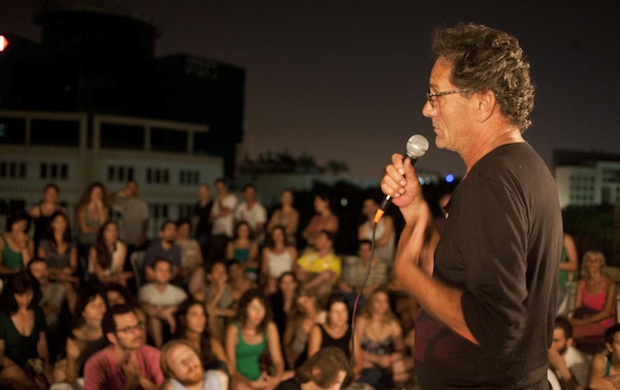In response to Desmond Tutu’s call on the Capetown Opera Company to cancel their 2010 tour in Israel, director Michael Williams said, “arts and academics are never the right place to boycott.”
These words jumped into my mind this week as I read of the organization Im Tirzu’s demonstrations against actor and director Mohammad Bakri, and the urging of Minister of Culture and Sport Limor Livnat to ban Bakri from Israeli stages.
At present, Bakri is in rehearsals for an interpretation of Frederico Garcia Lorca’s 1936 play, The House of Bernarda Alba, which will run at Tzavta Theater. The participants in this production are Bakri’s theater students from the Academy of Performing Arts in Tel Aviv.
Since 2003, when Bakri released his film Jenin, Jenin, harsh criticism of the Palestinian artist has lurked around every corner. The film was about the events that took place during the 2002 clashes between the IDF and residents of the Jenin refugee camp in the West Bank.
Time and again, Bakri has been questioned about his film Jenin, Jenin. The Supreme Court of Israel ruled that Bakri broke no laws in the creation of this controversial piece. And yet, for the past eight years, Bakri has been all but blacklisted in Israel.
“We are the people of Israel,” shouted the director and spokesperson for Im Tirzu during a televised interview. “And the people of Israel are tired of letting terrorists perform on Tzavta’s stage.” The organization is an extra-parliamentary movement dedicated to strengthening Zionist values in Israel. Among their many activities, Im Tirzu’s members have been known to spy on university professors who they suspect of subversion.
There is no controversy surrounding Bakri’s talent as a performer. And though his work in the past has been directly connected to the political situation in Israel, this play is not.
Tzavta is a government-funded theater, and Livnat and Im Tirzu thus believe that it is not an appropriate venue for Bakri’s work. It should be noted that The House of Bernarda Alba is not a Tzavta production, but rather that of an outside entity that is being hosted by the theater.
“You can’t interfere with art,” said Yankale Mandel, founder and director of the Israeli Union for Performing Arts, in response to Livnat’s statement, which essentially left the decision whether or not to give Bakri the boot to the directors of Tzavta.
As far as I am concerned, the folks at Im Tirzu can think what they want and demonstrate to their hearts’ content. It’s a free country. However, when the Minister of Culture and Sport decides to chip in her two (I would argue McCarthyistic) cents, then there’s a problem.
The House of Bernarda Alba is a story of an overpowering mother who oppresses and dominates her five daughters excessively. It seems poetic that the narrative in this play mirrors Livnat’s actions so perfectly.
If, in the state of Israel, we accept the interference of politicians in the art sector, the imposition of censors and blacklists, we are lost.
Read also:
Im Tirzu campaign: deciphering a wink
Rightwing group publishes Nakba denial booklet
Exclusive: The gov’t connection of rightwing group Im Tirzu
Israeli actors: we won’t perform in the settlements

